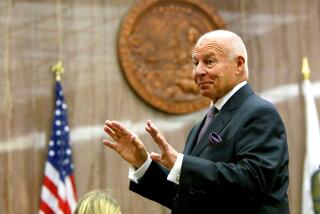Bar OKs Limits on Lawyer, Client Sex : Ethics: Under proposal, attorneys may not demand relations and may not use intimidation. If a relationship develops, the lawyer may not continue as counsel in some cases.
- Share via
The California State Bar on Saturday became the first in the nation to adopt a precedent-setting ethics rule that governs sexual conduct between lawyers and their clients.
Voting 18 to 4 for the rule at its meeting in Los Angeles, the Bar’s board of governors rejected an earlier proposal to ban sex altogether between lawyers and clients, opting instead to regulate sexual conduct.
Under the rule, which must be approved by the state Supreme Court, lawyers may not demand sex with clients and may not use intimidation to advance sexual relationships. Likewise, if a sexual relationship develops between a lawyer and client, the lawyer may not continue as counsel if the relationship could adversely affect the case.
Punishment for a lawyer found guilty of breaking the rule would range from a reprimand to disbarment.
One outcome of the new rule, Bar members stressed Saturday, will be to formulate a more accurate picture of the number of people--particularly women in emotionally charged divorce or custody cases--pressured into sex by their lawyers.
The 1989 state law that required adoption of a rule governing sexual conduct instructs the Bar to keep records on how many complaints are reported and how they are resolved. The Legislature and the Bar are to review the data in three years.
Catherine C. Sprinkles of San Jose, a board member, said the ethics rule sends a message to attorneys that “it’s not professional to have sex with your client.”
Sprinkles, however, like most Bar members, said she was troubled with an earlier proposal that would have prohibited all sex between lawyers and clients. It was not appropriate, she said, to punish a lawyer unless the sexual relationship had harmed the client.
Bar President Charles S. Vogel hailed the rule as one lawyers can live with and said it met the legislative mandate for the Bar to police the sexual conduct of its members and their clients.
In a novel twist on the principle that the accused is innocent until proven guilty, the ethics rule says that a lawyer involved in sexual misconduct bears the burden of proof that the relationship did not adversely affect the client’s case.
It was the decision to shift the burden of proof from the client to the lawyer that allowed the Board of Governors and Assemblywoman Lucille Roybal-Allard (D-Los Angeles) to come to an agreement on the shape of the rule.
Roybal-Allard wrote the state law that directed the Bar to come up with the new ethics rule after two clients of well-known divorce lawyer Marvin Mitchelson accused him of rape. An investigation by the district attorney found insufficient evidence to bring charges against Mitchelson.
Roybal-Allard, as well as at least one member of the Board of Governors, Richard A. Annotico, wanted an outright ban on sex between lawyers and clients. That would have been similar to the ban on sex between patients and their psychologists or psychiatrists. Most members of the Bar, however, balked at such a sweeping rule, arguing that it flew in the face of an individual’s constitutional right to privacy.
Robert M. Talcott of Los Angeles, a board member who headed the committee that wrestled with the rule, said the relationship between lawyer and client is inherently different than the relationship between mental health professionals and their patients. For therapy to be successful, Talcott said, the patient and the therapist must form an intimate bond. That is not necessary in the case of a lawyer and client, he said.
Last month, when a proposed ban failed to get enough votes on the Board of Governors, the Bar and Roybal-Allard agreed to negotiate.
On Saturday, the assemblywoman said her concerns were not confined to women at the hands of male attorneys.
Since she and the Bar began the debate over sexual conduct of lawyers, she said, she has received calls from males who felt they were being pressured by their attorneys to enter into sexual relationships. She said the calls came from gay men with gay male attorneys and from heterosexual men with female attorneys.
The compromise adopted Saturday was proposed by Dorothy M. Tucker, a San Francisco psychologist and public member of the board.
“As a person who was not a lawyer,” Tucker said after the Bar meeting, “I probably brought a little more objectivity (to the issue).” Tucker said she has treated women who have been sexually victimized by their attorneys.
In a speech to the board, Roybal-Allard said she was satisfied with the new rule and believed that it reflected the changing “times in which we increasingly highlight the need to redefine the roles of men and women in our culture, and times in which we define the meaning of abuse of power.”
More to Read
Sign up for Essential California
The most important California stories and recommendations in your inbox every morning.
You may occasionally receive promotional content from the Los Angeles Times.













